The Lowy Institute Poll 2016
The 2016 Lowy Institute Poll looks at Australians' reactions to a year of elections − the Australian election, the US presidential election and the selection of a new UN Secretary-General.
The Poll, the twelfth annual Poll by the Lowy Institute, also examines attitudes to other important issues such as freedom of navigation in the South China Sea, foreign investment in Australian farmland and military engagement in Iraq and Syria. The Poll provides data on how public opinion on some of our most important relationships, including those with China and the United States, is evolving.
Explore the updated 2016 click Lowy Poll Interactive, or see the full 2016 report below.

- 2016 has seen the largest shift in sentiment on the US alliance since 2009, with 71% of the Australian public saying it is very or fairly important to Australia's security, down nine points and the lowest level since 2007. Almost half the population said Australia should distance itself from the United States if it elected a president like Donald Trump.
- China and the United States are tied when Australians are asked which relationship is the more important to Australia: 43% nominate the US and 43% nominate China. China also has a clear lead over Japan as Australia’s best friend in Asia (30% say China and 25% say Japan is our ‘best friend in Asia’).
- 74% of Australians are in favour of Australia conducting freedom of navigation operations in response to China’s activities in the South China Sea.
Preface
This is the twelfth annual Lowy Institute Poll.
2016 is a year of elections, with a federal election in Australia, a presidential election in the United States, and the selection of a new Secretary-General of the United Nations.
The 2016 Lowy Institute Poll provides new data on how Australians feel about these various contests.
We revisit a question we last asked in the 2013 election year about which political party Australians believe will do a better job of handling a number of important foreign policy issues.
US presidential election campaigns are always colourful. This year, they have teetered on the edge of weirdness. In the 2016 Poll, we test public opinion on the ‘Trump factor’ and its impact on the way Australians view our long-standing alliance with the United States.
In the past, Australians have looked positively on our participation in the United Nations Security Council. This year’s Poll includes questions on the new Secretary-General and feelings towards the United Nations more generally.
Before Malcolm Turnbull became prime minister in September 2015, public optimism about our economic performance in the world had slipped dramatically. This year, we find that Australians’ economic outlook has brightened, but is tempered by concerns about the trajectory of the Chinese economy on which so much of our prosperity depends.
Following the terrorist attacks in Paris late last year, one might have expected terrorism to loom large in Australians’ responses in the 2016 Poll. But when we asked Australians about their overall policy priorities, we found that terrorism seems not to be among their chief concerns. In fact, Australians are primarily preoccupied with domestic concerns. This does not mean, however, that they don’t have strong views on international issues such as freedom of navigation patrols and next-generation submarines.
Every Lowy Institute Poll has included questions designed to understand how China fits into Australians’ views of the world. China’s military activities in the South China Sea continue to provoke debate about strategic competition between China and the United States, and about China’s intentions and its impact on regional stability. Once again, the 2016 Poll contains fascinating findings about China, not all of which are positive. Strikingly, however, China now has a clear lead over Japan as Australia’s best friend in Asia, which was not the case when we first asked this question two years ago.
Europe has experienced some traumatic developments in the past twelve months. This year, therefore, the Lowy Institute Poll examines Australians’ views of Europe, producing interesting findings on Europe’s economy and the impact of the massive refugee movements which have shaken the regional order.
Australians’ attitudes to immigration and our refugee intake are also among the thought-provoking findings of this year’s Poll. Following a difficult period in our relationship with Indonesia, feelings towards Indonesia have rebounded surprisingly quickly. Australians have clear opinions on the importance of this bilateral relationship.
Finally, following the UN Paris conference in late 2015, we find once again that Australians’ concerns about global warming and their attitudes to fossil fuels are shifting perceptibly, putting climate change and our future energy policy firmly on the agenda of whomever wins government on 2 July.
The 2016 Lowy Institute Poll is, like all eleven of its predecessors, a compelling read for any Australian with an interest in our country’s role in the world.
Michael Fullilove
Executive Director
June 2016
Executive Summary
Election 2016
The Coalition has improved on its 2013 results when Australian adults were asked which of the two major political parties they favour to handle key foreign policy issues. The Coalition leads on seven of eight issues, including handling the US alliance (57% Coalition to 25% Labor), national security (53% to 29%), economic management (53% to 31%) and foreign investment (50% to 33%). It leads by a smaller margin on managing relationships with China and Asia, and handling asylum seekers. In 2013, the Coalition led on only five of the eight issues, but with stronger leads that year on economic management, national security, foreign investment and handling asylum seekers. In 2016, Labor leads only on the issue of managing Australia’s response to climate change (52% Labor to 31% Coalition).
Australian prime ministers and foreign policy
John Howard is the most well-regarded of all living former and current Australian prime ministers for their handling of Australia’s foreign policy, with 82% of Australians saying he has done a ‘very good’ or ‘reasonable’ job. Mr Howard has a clear lead over the other prime ministers on this measure, with Kevin Rudd (69%), Bob Hawke (68%), Malcolm Turnbull (68%) and Paul Keating (66%) ranking significantly behind Mr Howard. Julia Gillard was rated by 58% as having done a very good or reasonable job. Tony Abbott was ranked the lowest (46% saying very good or reasonable job), and is the only prime minister whom a majority say has done a ‘poor’ job (52%).
Donald Trump and the US alliance
Almost half (45%) of Australians say ‘Australia should distance itself from the United States if it elects a president like Donald Trump’. A bare majority (51%) say Australia ‘should remain close ... regardless of who is elected US President’. Support for the US alliance has slipped nine points: 71% of Australians see the alliance as ‘very’ or ‘fairly’ important to Australia’s security, the lowest level of support since 2007, but still eight points higher than the result that year.
Australians’ economic outlook
Optimism about the Australian economy has lifted, with 70% of Australians now ‘very optimistic’ or ‘optimistic’ about ‘Australia’s economic performance in the world over the next five years’, up seven points since 2015.
Important issues facing Australia
Given a list of ten issues drawn from both domestic and foreign policy spheres, Australians put ‘education’ as the highest priority, with 88% seeing it as a ‘very important’ issue. ‘Health’ runs second (83%), followed by ‘domestic violence’ (79%) and ‘the economy’ (77%). ‘Terrorism and national security’ ranks fifth (68% saying ‘very important’), at a similar level to ‘dysfunction in Australian politics’ (65%). Further behind are ‘refugees and asylum seekers’, ‘immigration’ and ‘climate change’ (58%, 57% and 57%, respectively). Only 40% see ‘China’s rise’ as a very important issue.
Australia’s role in the world
Not only are Australians primarily focused on domestic issues, they are also divided on our role in the world. Half (50%) say ‘Australia should mind its own business in international affairs and concentrate more on our own national problems’, while around half (48%) say ‘Australia should aim to play a more influential role in the world’.
Military action against Islamic State in Iraq and Syria
The 2016 Poll finds the same strong support for conducting air strikes against Islamic State in Iraq as it did in 2015 (69% in favour), but more people are strongly in favour (41%, up five points from 2015). A majority (59%) also support ‘air strikes against Islamic State in Syria’.
Next-generation submarines
Australians have strong views on where Australia’s next fleet of submarines should be built, with 70% saying ‘the submarines should be built mainly in Australia, even if this will cost us more’. Only 26% say ‘the submarines should be built at the best possible price, even if this means they are mainly built overseas’.
Australia’s best friend in Asia
In a clear shift from 2014, China now has a clear lead over Japan, Indonesia, Singapore, India and South Korea when Australians are asked to identify ‘Australia’s best friend in Asia’. For 30%, China is now our ‘best friend in Asia’, compared with 25% saying Japan. In a six-point lift from 2014, 15% of Australians now say Indonesia is our ‘best friend in Asia’, followed by Singapore (12%), India (6%) and South Korea (4%).
Australia, the United States and China
When asked which is more important to Australia – the relationship with the United States or the relationship with China – exactly the same number of Australians say China (43%) as say the United States (43%). In 2014, only 37% nominated China as more important compared with 48% nominating the US as the more important relationship.
Attitudes to China
Positive influences on Australians’ views of China include ‘Chinese people [they] have met’ (85% saying they are a positive influence), ‘China’s culture and history’ (79%), and ‘China’s economic growth’ (75%). The most negative influence is ‘China’s human rights record’ (86% saying it has a negative influence on their views). ‘China’s military activities in our region’ are a negative influence for 79%, while ‘China’s system of government’ (73%), its ‘environmental policies’ (67%) and ‘Chinese investment in Australia’ (59%) are also negative influences on most Australians’ views of China.
Freedom of navigation in the South China Sea
A significant majority of Australians (74%) are in favour of Australia ‘conducting maritime operations … in an effort to ensure freedom of navigation in the South China Sea’, with only 20% against such action.
China’s economy
Around half (52%) of Australians say ‘China’s economy will continue to grow strongly and this will benefit Australia’, while 44% say ‘China’s economy will slow down and the Australian economy will suffer’.
Foreign investment in Australian farmland
Most Australians (87%) are opposed to ‘the Australian government allowing foreign companies to buy Australian farmland’, up six points from their response in 2012 to a very similar question.
Democracy
For just 61% of the population and 54% of 18–29 year olds, ‘democracy is preferable to any other kind of government’. Nearly a quarter (24%) of Australians say ‘in some circumstances, a non-democratic government can be preferable’, in results consistent with previous Lowy Institute polling.
Refugees and immigration
Australian support for the policy of turning back boats continues, with 63% agreeing that ‘stopping the boats means that Australia can take in more refugees through UN processes’. Only 45% say ‘Australia is a wealthy country which should accept more refugees than it does today’. However, 62% say ‘the government was right in 2015 to agree to settle 12,000 Syrian refugees in Australia’ and most (65%) disagree that ‘Australia’s refugee intake should favour Christians and other religions over Muslims’. In response to a series of questions about immigration, most Australians are positive about immigration and its impact on the economy.
Indonesia
Following a low point in 2015, Australian sentiment towards Indonesia has rebounded: feelings towards Indonesia are at 54°, up eight degrees to its equal highest reading in Lowy Institute polling history. Almost all Australians (91%) say Indonesia is important to Australia.
Europe
Most Australians (84%) say ‘Europe plays a major role in the global economy’ and 82% say trade with Europe is important to the Australian economy. However, a majority (63%) agree that ‘Europe’s immigration crisis is making Europe weaker’ and 61% say ‘Europe is in decline relative to Asia’.
Climate change and fossil fuels
Concern about global warming continues to trend upwards: 53% of Australians say ‘global warming is a serious and pressing problem [and] we should begin taking steps now even if this involves significant costs’ (up 17 points since 2012). Almost all agree that ‘the use of fossil fuels is in decline and Australia should invest more in alternative energy sources’ (88%), and most say ‘we should reduce our reliance on them to help combat climate change’ (79%). However, a majority also express support for continuing coal exports ‘to developing countries, to help them grow and reduce poverty’ (66%) and ‘to keep our economy strong’ (53%).
The United Nations and the next UN Secretary-General
Australians feel warmly towards the United Nations, giving it a 62° reading on the 2016 feelings thermometer. They are divided on whether Kevin Rudd would be a good Secretary-General: 46% say he would and 49% say he would not be a good Secretary-General.
The Lowy Institute feelings thermometer
As is always the case, an English-speaking nation tops the feelings thermometer this year, Canada registering a warm 84°, up three degrees. At the bottom of the thermometer and falling is North Korea at 26°. The largest movement this year is Indonesia’s eight degree warming to 54°, its equal highest reading in 11 years.
The 2016 Lowy Institute Poll reports the results of a nationally representative opinion survey of 1202 Australian adults conducted by telephone between 26 February and 15 March 2016. The maximum sampling variance (‘error margin’) is approximately +/- 2.8%.
Australia and the world
Election 2016
On 2 July 2016, Australians will vote in the 2016 federal election. In the 2016 Lowy Institute Poll we repeated a question from our 2013 Poll and asked voting-aged Australians for their perceptions of the foreign policy strengths of the two major political parties: the incumbent Liberal-Nationals Coalition and the Australian Labor Party.
The Coalition is again the clear choice of Australians for handling foreign policy in the lead-up to this year’s election. The Coalition has recorded a decisive lead over Labor on seven of eight foreign policy issues –
a stronger result than in 2013, in which it was favoured over Labor on only five of the eight issues.
The Coalition’s biggest lead this year is for ‘maintaining a strong alliance with the United States’, with well over two to one Australians favouring the Coalition over Labor (57% to 25%) for handling the alliance. On maintaining national security, the Coalition leads Labor by a wide margin: 53% of Australians say the Coalition would do a better job of ‘ensuring Australia’s national security is maintained’, compared with 29% favouring Labor on handling national security.
Perceptions of the Coalition’s economic management have shifted since our Poll last year. The Coalition leads Labor strongly on ‘managing the Australian economy over time’, with 53% of Australians saying the Coalition would do a better job of managing the economy (31% preferring Labor). This contrasts with the weak mark (4.9/10) that Australians gave the Coalition government in our 2015 Poll when we asked them to mark the Coalition out of ten for its management of Australia’s economy.
By a slightly smaller margin, the Coalition again leads Labor on ‘managing foreign investment in Australia’ (50% to 33%). Compared with the responses in our 2013 Poll on these questions, however, Australians’ confidence in the Coalition’s ability to manage both the economy and foreign investment appears to have slipped somewhat. On economic management, 61% preferred the Coalition in 2013 compared with 53% in 2016, while its support for managing foreign investment has slipped from 59% in 2013 to 50% in 2016.
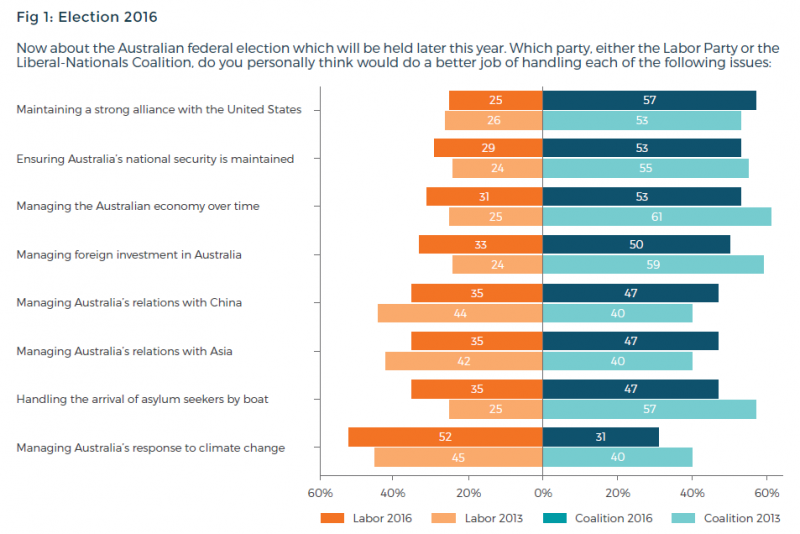
On Australia’s diplomacy in Asia, the Coalition is the preferred choice for managing both the relationship with China and relations with Asia more broadly (47% compared with 35% preferring Labor).
By the same margin (47% to 35%), the Coalition again rates more strongly than Labor on ‘handling the arrival of asylum seekers by boat’, despite receiving a barely average result of 4.9/10 for its handling of this issue in our 2015 Poll.
Climate change is the only issue on which Labor leads the Coalition, but it is a significant lead: 52% of Australians say Labor would do a better job of ‘managing Australia’s response to climate change’, compared with 31% for the Coalition.
While the Coalition leads Labor on more issues than in 2013, its lead is smaller this year on economic management (53% to 31% compared with 61% to 25% in 2013), national security (53:29 vs 55:24), foreign investment (50:33 vs 59:24) and handling asylum seekers (47:35 vs 57:25).
Australian prime ministers and foreign policy
In the lead-up to this year’s election, we asked Australians a new question in our 2016 Poll to find out how they judged Australian prime ministers on their management of Australia’s foreign policy. From a list of six former (living) prime ministers and the current prime minister, we asked whether each had done a ‘very good’, ‘reasonable’ or ‘poor’ job ‘in handling Australia’s foreign policy’.
John Howard is the most successful prime minister on this measure according to the Australian public, with 82% saying he has done a very good or reasonable job in handling Australia’s foreign policy. Mr Howard has a clear lead over the remaining living prime ministers. For Kevin Rudd, 69% say he has done either a very good or reasonable job. For Bob Hawke and Malcolm Turnbull, the number is 68%, and for Paul Keating, 66%. Julia Gillard ranks behind Mr Keating but ahead of Tony Abbott, with 58% of the population saying she has done a very good or reasonable job in handling Australia’s foreign policy.
Australians appear to have been disappointed in Mr Abbott’s performance on foreign policy according to our 2016 Poll, ranking him the lowest of all seven of the living (former and current) prime ministers of Australia based on their foreign policy performance. Mr Abbott is the only prime minister whom a majority of Australians say has done a poor job. There is also a wide margin between Mr Abbott and Mr Turnbull on their foreign policy performance (46% saying Mr Abbott, vs 68% saying Mr Turnbull, has done a very good or reasonable job in handling Australia’s foreign policy).
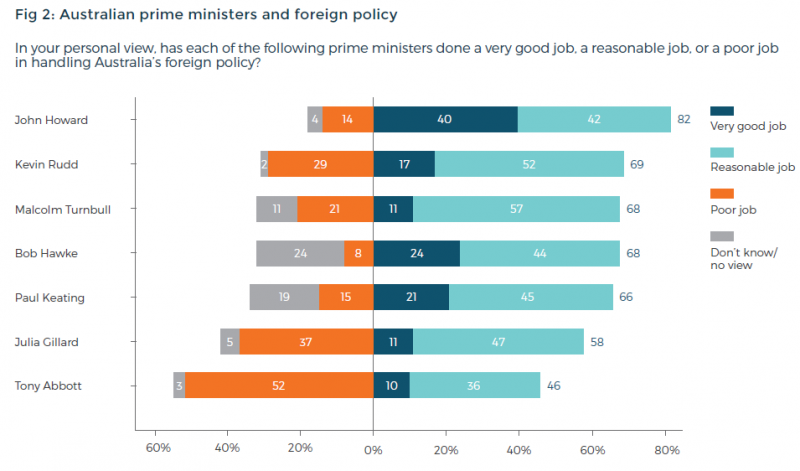
Donald Trump and the US alliance
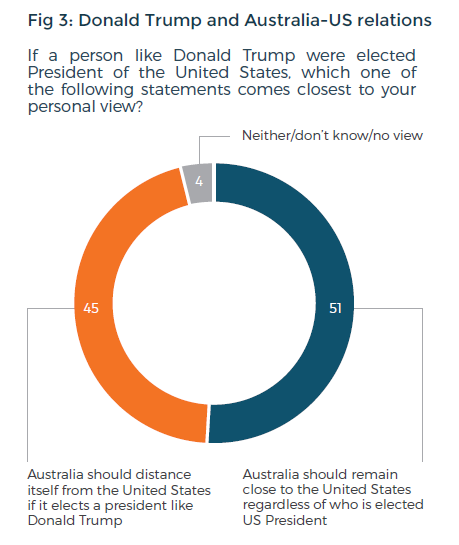
Faced with the prospect of a Donald Trump presidency in the United States, almost half (45%) of Australian adults say that ‘Australia should distance itself from the United States if it elects a president like Donald Trump’. Only a bare majority (51%) say we ‘should remain close to the United States regardlessof who is elected US President’.
This result is striking in the context of Australians’ very consistent support for the ANZUS alliance over the history of the Lowy Institute Poll. Overall support for the alliance (the proportion of Australian adults who say the alliance is either ‘very’, ‘fairly’ or ‘somewhat’ important to Australia’s security) has never dropped below 90%.
In the context of intense media attention on the Trump candidacy and general disquiet about the US political process, the number of Australians who now see the alliance as either very or fairly important to Australia’s security has fallen significantly, down nine points to 71%. This is the second-lowest level of support on this measure in our 12-year polling history, although eight points higher than the lowest result of 63% in 2007, towards the end of the presidency of George W. Bush. That year, 69% of Australian adults said that ‘President George W. Bush’ caused them to feel unfavourably towards the United States. Overall support for the alliance has also slipped slightly (down three points to 93% saying the alliance is very, fairly or somewhat important to Australia’s security).Even among the strongest supporters of the alliance (those who say it is very or fairly important), nearly four in ten (39%) say Australia should distance itself from the United States if it elects a president like Donald Trump, suggesting that the ‘Trump factor’ may be having an impact on Australians’ support for the alliance.
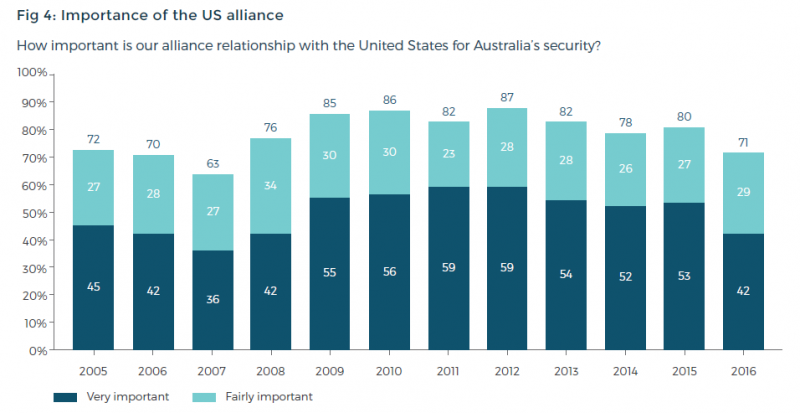
Australia's economic outlook
Optimism about the Australian economy has lifted this year after the sharp decline recorded in last year’s Poll, when public optimism about the performance of the Australian economy in the world dropped to its lowest level since our first Poll in 2005.
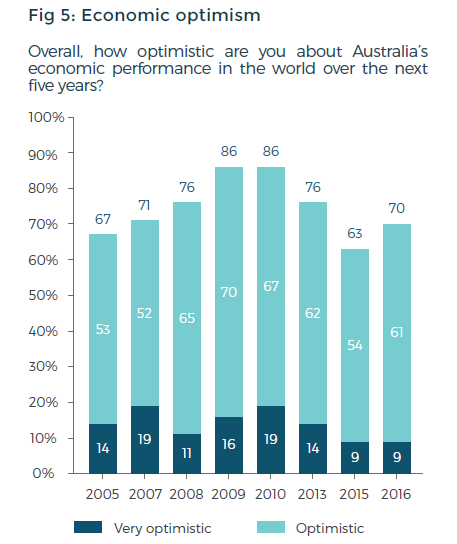
In 2016, 70% of Australians are either ‘very optimistic’ or ‘optimistic’ about ‘Australia’s economic performance in the world over the next five years’. This is a seven-point increase on last year’s result, which represented the single-largest fall in optimism in our polling history. However, the overall level of optimism this year is still 16 points lower than its peak at the height of the financial crisis during 2009–10, when 86% of Australians were optimistic about the future of Australia’s economy.
Despite this year’s lift in optimism overall, the proportion of Australians who are very optimistic about the economy remains at 9%, unchanged since last year.
Important issues facing Australia
The past 11 years of Lowy Institute polling have delved into Australian public opinion on many of the central foreign policy issues, risks and threats of our time, but have rarely assessed where those issues fit within the broader matrix of Australians’ policy concerns. In a departure this year, we formulated a list of ten ‘important issues facing Australia at the moment’, and asked Australians to rate their importance on a scale of ‘very important’, ‘somewhat important’ or ‘not important’.
Our results show that foreign policy issues are not foremost in Australians’ minds in 2016. The three top-ranked issues are education, health and domestic violence, with the economy ranking fourth. Of highest concern to Australians is education, with 88% seeing it as a very important issue. In second place, 83% of the population say health is a very important issue facing Australia at the moment.
Nearly eight in ten (79%) say domestic violence is very important, and 77% rank the economy as very important.
Perhaps unexpectedly, ‘terrorism and national security’ ranks fifth, with 68% seeing this as a very important issue. This mid-range ranking of terrorism and national security, behind domestic concerns such as education and health, is quite striking in the context of our results last year on the question of risks to Australia’s national security. When we asked Australians to assess a range of ‘possible risks to Australia’s security in the next ten years’ in our 2015 Poll, risks related to terrorism ranked first, second and third in perceptions of risks to national security.
At a similar level of importance to terrorism and national security in 2016 is the state of our domestic politics. Between 2010 and 2015, Australia changed prime ministers four times, with three leadership changes occurring between federal elections. Australians this year regard ‘dysfunction in Australian politics’ as an issue of similar importance to terrorism and national security, with 65% of the public seeing it as a very important issue.
Refugees and asylum seekers, immigration and climate change are regarded as very important by 58%, 57% and 57% of the population, respectively. On the issue of immigration, feelings are stronger among people born in non-English speaking countries, 72% of whom say immigration is a very important issue compared with just 55% of those born in Australia or other English-speaking countries.
Only 40% of the country see ‘China’s rise’ as a veryimportant issue.
Gender is a factor in these attitudes. There were marked differences between men’s and women’s views on seven of the ten issues in our list. The most pronounced differences were for health (88% women seeing it as very important vs 78% men); domestic violence (85% women, 73% men); terrorism and national security (74% women, 62% men); refugees and asylum seekers (65% women, 52% men), and immigration (62% women, 51% men). The only issues where differences were insignificant were the economy, ‘dysfunction in Australian politics’, and ‘China’s rise’.
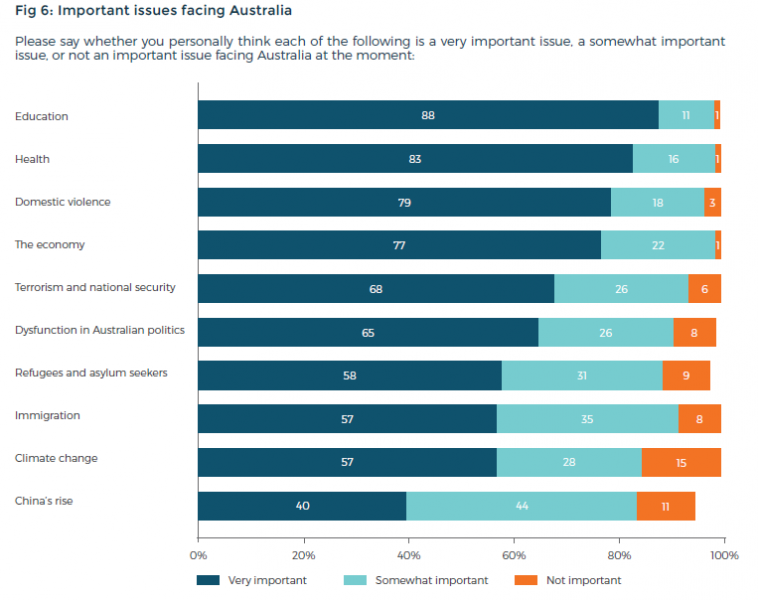
Australia's role in the world
Australians’ preoccupation with domestic issues appears to influence their view on the role they think Australia as a nation should play in the world. On this, they are evenly divided between those who think Australia should play more of a global role, and those who think the focus should be more on domestic issues. Around half (48%) say ‘Australia should aim to play a more influential role in the world’ while exactly half (50%) say ‘Australia should mind its own business in international affairs and concentrate more on our own national problems’.
Military action against Islamic State in Iraq and Syria
More than a year after the Australian Defence Force commenced air strikes against Islamic State in Iraq,[1] Australians are just as firmly in support of these actions as they were in 2015: 69% are in favour of ‘conducting air strikes against Islamic State in Iraq and providing training and support to Iraqi security forces’. While this is exactly the number who were in favour of the same military actions in our 2015 Poll, 41% are strongly in favour (an increase of five points from 2015).
There is also clear public support for air strikes in Syria, although not as strong as for Iraq, after Australia extended its operations to Syria in mid-September 2015.[2] In 2016, 59% of the public are in favour of Australia ‘conducting air strikes against Islamic State in Syria’, with just over a third (37%) against such action.
Next-generation submarines
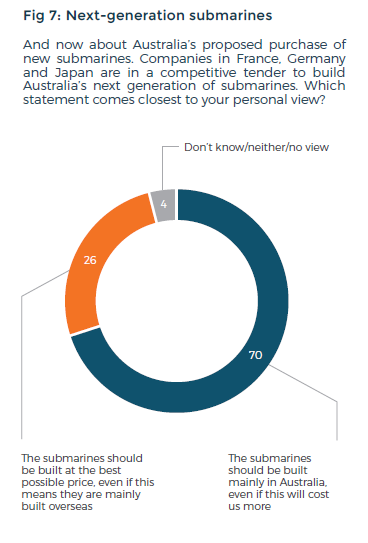
Following a competitive evaluation process of tenders from France, Germany and Japan for the building of Australia’s next generation of submarines to replace the current Collins-class fleet, the French company DCNS was selected in April 2016 as the preferred partner for the design of the 12 future submarines.[3] The recent Defence White Paper confirms that the new submarines will likely enter service in the early 2030s.[4]
The site of the submarine construction project has been a topic of considerable public and political debate, with pressure to involve Australian shipbuilders and labour to stimulate the domestic economy and provide jobs.[5]
In an emphatic result, 70% of Australians say ‘the submarines should be built mainly in Australia, even if this will cost us more’. Only 26% say ‘the submarines should be built at the best possible price, even if this means they are mainly built overseas’.
Australia's best friend in Asia
Not only is China Australia’s largest trading partner,it now has a clear lead over Japan, Indonesia, Singapore, India and South Korea when we ask Australians to identify ‘Australia’s best friend in Asia’. In 2016, 30% say China is our best friend in Asia, compared with 25% saying Japan. This is a clear shift from 2014 when we last posed this question. China and Japan ranked equally that year, with 31% nominating China and 28% Japan as Australia’s best friend in Asia, in a statistically equivalent result.
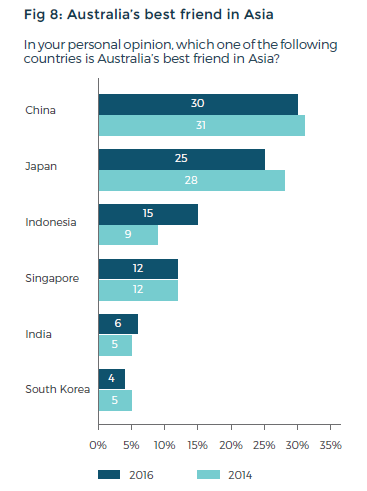
Among younger Australians, China has an even clearer lead this year: 36% of 18–44 year olds see China as our best friend in Asia while only 21% of that age group regards Japan as Australia’s best friend in Asia.
In another clear shift, Indonesia has overtaken Singapore and now comes third in the 2016 ‘best friend’ stakes. It is seen by 15% of Australians as our best friend in Asia, an increase of six points from 2014 when it held fourth place behind Singapore. Singapore now comes fourth, with 12% seeing it as Australia’s best friend in Asia. India and South Korea are further behind, with 6% and 4% of the population, respectively, seeing them as our best friend in Asia.
Australia, the United States and China
In our 2016 results, China has closed the gap, and the two countries are now in a deadlock in Australians’ eyes. Public opinion is evenly divided on whether Australia’s relationship with China or the United States is the more important. The number who say Australia’s relationship with the United States is the more important (43%) is exactly the same as the number who nominate the China relationship as more important (43%). In 2014 when last asked this question, 48% of Australians said the relationship with the United States was more important; 37% said China was the more important relationship.
In economic terms, however, our polling in the past has found that China far surpasses the United States in terms of perceived economic importance to Australians, with 76% saying China was the most important economy to Australia in 2013, 60 points ahead of the United States.
This new deadlock does not apply evenly across the generations. In fact, the Australian population is split down the middle on the China/US question, with younger Australians under 45 years of age leaning towards China, 51% saying China is the more important relationship, and only 35% saying the United States. Conversely, 51% of older Australians (45 years and above) still see the US relationship as more important, only 36% choosing China.
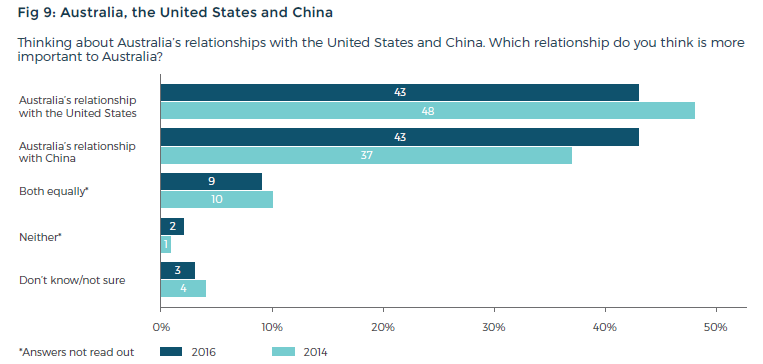
Attitudes to China
To understand what drives these conflicting sets of feelings about China, we presented a series of eight possible factors and asked Australians whether each was a positive or negative influence on their overall view of China.
The results suggest Australians see much to admire about China, but some aspects of Chinese society and policy elicit very negative responses, particularly among older generations of Australians. Chinese people, culture and history, and China’s economic growth are strongly positive influences on attitudes, with 85% of Australians saying ‘Chinese people [they] have met’ are a positive influence on their view of China, while 79% see ‘China’s culture and history’ as a positive influence and 75% see its economic growth as a positive influence on their view.
On the opposite side of the ledger, Australians react most strongly to ‘China’s human rights record’, with 86% of the Australian public saying it has a negative influence on their views. ‘China’s military activities in our region’ also provoke strong responses, with 79% saying these influence their views negatively. Other negative influences are ‘China’s system of government’ (73% saying it negatively influences their view), its ‘environmental policies’ (67%) and ‘Chinese investment in Australia’ (59%).
Some of these factors weigh more heavily on older Australians, including China’s human rights record (93% of those 60 years and older saying a negative influence), China’s military activities (88% of those 45 years and older saying a negative influence), and Chinese investment (a negative influence for 65% of those 60 years and older).
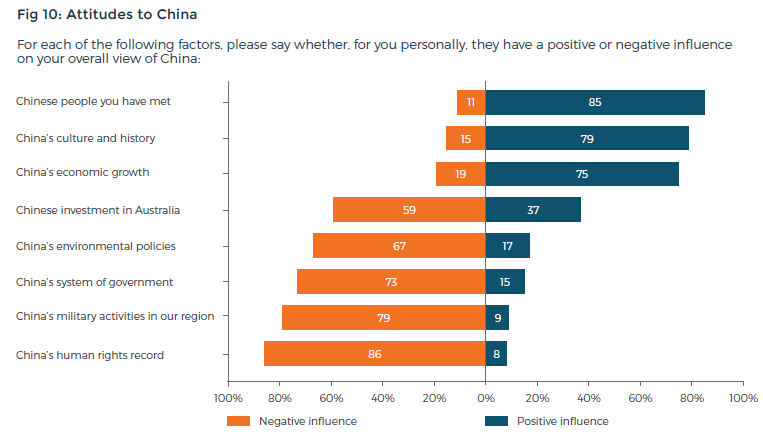
Freedom of navigation in the South China Sea
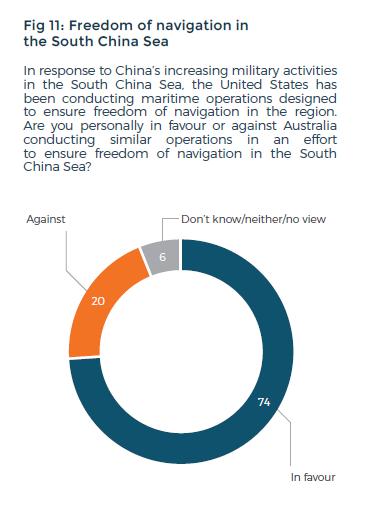
In the past two years, tensions have heightened between China and its neighbours over Beijing’s activities in the South China Sea. China’s construction of runways and buildings on rocks and submerged reefs in the Spratly Islands has strained relations in the region and caused friction between China and the United States, while the Philippines has raised a legal challenge questioning China’s maritime claims. US Navy ships have conducted three ‘freedom of navigation’ operations since October 2015 to challenge excessive maritime claims in the South China Sea.[6]
To gauge Australians’ reaction to this, we asked this year whether they are ‘in favour or against Australia conducting similar operations in an effort to ensure freedom of navigation in the South China Sea’. In a remarkably strong response, 74% of the public are in favour of Australia conducting similar operations, with only 20% against.
China’s economy
While most Australians view China’s economic growth positively, public opinion is divided on whether this growth will continue at the rapid pace of the past three decades. China’s real gross domestic product has increased nearly 10% per annum on average since 1978, but the pace of growth has begun to slow.[7]
In 2016, around half (52%) of Australians say ‘China’s economy will continue to grow strongly and this will benefit Australia’, while almost as many (44%) say ‘China’s economy will slow down and the Australian economy will suffer’. This division of opinion may help explain why Australians’ optimism about the economy is still lower than it was six years ago at the height of the global financial crisis.
Foreign investment in Australian farmland
Australians tend to be wary of foreign investment, according to past Lowy Institute polling, and this wariness persists in this year’s Poll findings.
Foreign investment in agriculture and farmland has provoked strong reactions in the past, with 81% of the public in our 2012 Poll opposed to ‘the Australian government allowing foreign companies to buy Australian farmland to grow crops or farm livestock’. A significant majority in 2014 said they were against foreign investment in agriculture (60%), while opposition was less strident in relation to investment in Australian infrastructure and assets such as the National Broadband Network and Qantas. Some sectors even attract support for foreign investment, with a majority of Australians in favour of foreign investment in manufacturing (58%) and the financial sector (55%) in our 2014 Poll.
But this year, following political controversy over the future of various agricultural holdings such as the S. Kidman & Co cattle company sale and the Adani coal mine in Queensland,[8] public opinion has moved even further against foreign investment in Australian farmland. In 2016, 87% of Australians say they are against ‘the Australian government allowing foreign companies to buy Australian farmland’. This opposition is six points higher than it was in relation to our similar question in 2012,[9] while the proportion of those in favour has fallen seven points to 11%. As an indication of the force of this sentiment, 69% say they are strongly against allowing foreign companies to buy Australian farmland.

Attitudes to democracy
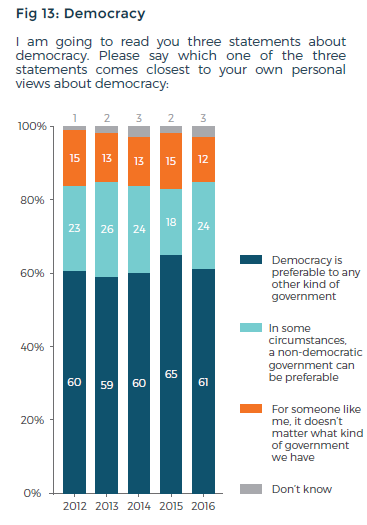
The Lowy Institute Poll’s findings on attitudes to democracy have attracted considerable attention since we first asked Australians their views on democracy in 2012.
In 2016, 61% of the voting-age population say that ‘democracy is preferable to any other kind of government’ (four points lower than last year but a similar level to previous years’ results). The number who say ‘in some circumstances, a non-democratic government can be preferable’ has risen six points this year to 24%, back to a level comparable with that recorded before 2015.
In previous Lowy Institute Polls, the responses of younger Australians to this question have been striking, with only a minority of the 18–29 year age group (ranging from a low of 39% in 2012 to a high of 49% in 2015) expressing a preference for democracy. The trend over the last two years has been upward, however, with 54% of 18–29 year olds in 2016 (up 12 points since 2014) saying democracy is preferable to any other kind of government. This year, as in previous years’ Polls, feelings about democracy strengthen with age. The preference for democracy is stronger among 45–59 year olds (61%) than for those aged under 45 (53%), and is strongest among those 60 years and over, 74% of whom express a preference for democracy over other forms of government.
Refugees and immigration
Attitudes to Australia’s refugee policies
Building on our series of past poll findings on asylum seeker policy, this year we tested public opinion on a number of different arguments about Australia’s refugee policies.
Public support for the policy of turning back boats continues in 2016, with 63% of Australians agreeing that ‘stopping the boats means that Australia can take in more refugees through UN processes’. Only 31% disagree.
Conversely, only a minority (45%) agree that ‘Australia is a wealthy country which should accept more refugees than it does today’; a narrow majority (53%) disagree. Taken together, these results suggest that ‘stopping the boats’ is a more popular basis on which to increase our refugee intake than the argument that ‘Australia is a wealthy country …’. Across the age groups, only among 18–29 year olds is there a majority view (albeit a slim 52% agreeing to 44% disagreeing) that Australia should accept more refugees because of its wealth.
However, despite their opposition to accepting more refugees in general, Australians have reacted positively to the government’s response to the Syrian refugee crisis, with 62% agreeing that ‘the government was right in 2015 to agree to settle 12,000 Syrian refugees in Australia’.[10]
Public opinion is strongly against prioritising Christians in our refugee intake, with only 32% of Australians agreeing (65% disagreeing) that ‘Australia’s refugee intake should favour Christians and other religions over Muslims’. This issue is more divisive among Australians aged 60 and over, with 49% of this age group agreeing and 50% disagreeing that our refugee intake should favour Christians and other religions over Muslims.
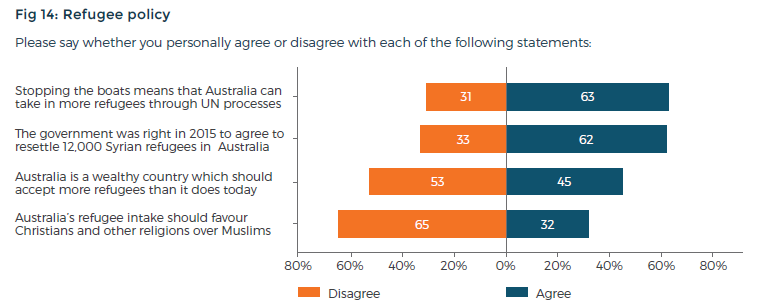
Immigration and the economy
Australians have expressed very positive attitudes to immigration in this year’s Lowy Institute Poll.
In response to six different statements (three broadly positive and three broadly negative) about immigration and immigrants, most Australians (73%) agree that ‘overall, immigration has a positive impact on the economy of Australia’. A clear majority (72%) agree both that ‘accepting immigrants from many different countries makes Australia stronger’ and ‘immigrants strengthen our country because of their hard work and talents’. When asked about the potential negative impacts of immigration, only a minority agree that ‘overall, there is too much immigration to Australia’ (40%) and that ‘immigrants are a burden on our social welfare system’ (40%). Only around a third (35%) agree that ‘immigrants take away jobs from other Australians’.
These results align with our previous polling on attitudes to immigration. In 2014, Australians were generally positive about the level of immigration, with only a minority (37%) that year saying the ‘total number of migrants coming to Australia each year is too high’.
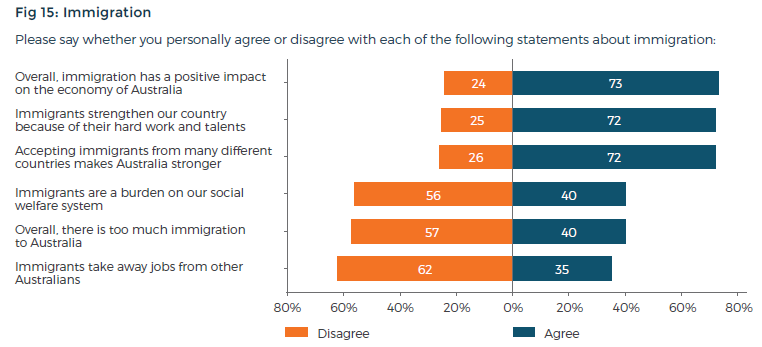
Indonesia
Australian sentiment towards Indonesia has rebounded following one of its lowest-ever results last year. The reading for Indonesia on the 2016 Lowy Institute feelings thermometer is 54°, up eight degrees to its equal highest reading in our polling history (see page 18 for full 2016 thermometer results).
Further, the vast majority of Australians (91%) consider our relationship with Indonesia to be important; 41% say Indonesia is ‘very important’ to Australia. Only 8% say it is ‘not important’.
Last year, feelings towards Indonesia hit their lowest point in eight years of polling, registering a cool 46° on the thermometer in the lead-up to the executions of Andrew Chan and Myuran Sukumaran in April 2015.
Yet this resilience in the relationship does not appear to be grounded in any real familiarity with Indonesia, at least according to our previous polling. Only one-third of Australians regarded Indonesia as a democracy in 2013 and 2015 (33% and 34%, respectively), despite Indonesia’s rapid democratic transition this century. When asked whether they admired Indonesia’s President Joko Widodo among a number of other world leaders in our 2015 Poll, nearly half (47%) of Australians were unable to answer.
Europe
With Europe affected by financial instability and, more recently, the immigration crisis, we included a number of statements about Europe in this year’s Poll to discover how Australians are reacting to these developments. In sum, Australians appear to be pro-Europe, but most recognise the challenges it faces.
For 84% of Australians, ‘Europe plays a major role in the global economy’, and almost as many (82%) say that ‘trade between Australia and Europe is important to the Australian economy’.
Like our relationship with the United States, Australia’s relationship with Europe is grounded in our shared values: almost all Australians (90%) agree that ‘Australians and Europeans share many common values and ideals and so Europe will always be important to us’.
But Australian attitudes to Europe are not unequivocally positive. A majority of the Australian public (63%) say that ‘Europe’s immigration crisis is making Europe weaker’, and similar numbers (61%) say that ‘Europe is in decline relative to Asia’. However, opinion is divided on whether ‘Europe is of decreasing importance to Australia’, with 47% agreeing and 50% disagreeing.
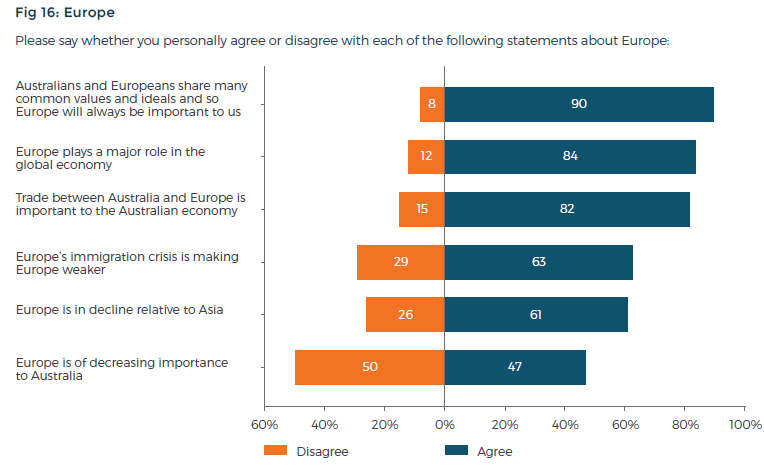
Climate change and fossil fuels
Concern about global warming
Australians’ concern about global warming continues to trend upwards. In a tracking question asked since 2006, the number of Australians who say that ‘global warming is a serious and pressing problem [and] we should begin taking steps now even if this involves significant costs’ has risen steadily from a low of 36% in 2012 to its current level, where 53% now take this view. This is an increase of 17 points since 2012. It remains 15 points lower, however, than the peak of concern recorded in 2006 when 68% expressed this view. Around a third (36%) say ‘the problem of global warming should be addressed, but its effects will be gradual, so we can deal with the problem gradually by taking steps that are low in cost’. Only 11% in 2016 say that ‘until we are sure that global warming is really a problem, we should not take any steps that would have economic costs’.
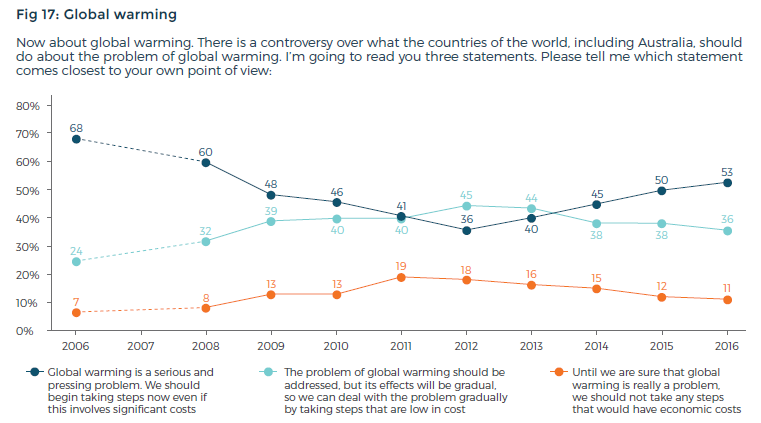
Fossil fuels
Following on from our questions last year about Australia’s future energy mix and the relative roles of fossil fuels and other forms of energy, this year we presented a series of arguments about fossil fuels to further explore views about Australia’s energy future.
A very significant majority (88%) of Australians agree in 2016 that ‘the use of fossil fuels is in decline around the world and Australia should invest more in alternative energy sources or risk being left behind’. Almost as many (79%) say that ‘the use of fossil fuels causes global warming and we should reduce our reliance on them to help combat climate change’. However, a majority (66%) also say that ‘Australia should continue to export coal to developing countries, to help them grow and reduce poverty’, and a further majority (though slight at 53%) say that ‘Australia has an abundant supply of fossil fuels and we should continue to use and export them to keep our economy strong’.
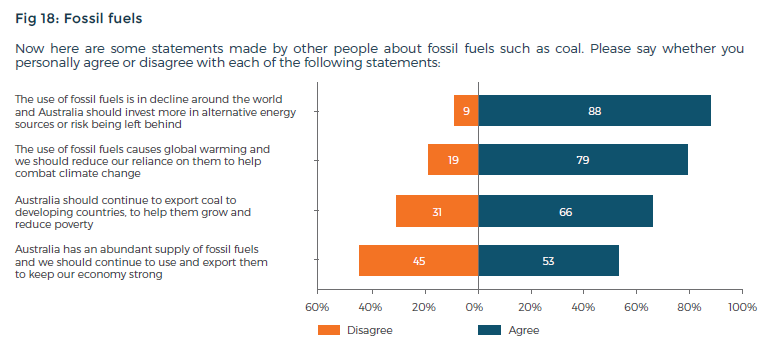
Secretary-General of the United Nations
The current Secretary-General of the United Nations, Ban Ki-moon, will finish his term in December 2016 and there has been much speculation in Australia that former prime minister Kevin Rudd will be a candidate for the job.
Australians are evenly split on whether Kevin Rudd would be a good Secretary-General of the United Nations.
In a statistically equal result, 49% of Australians say Mr Rudd would not be a good Secretary-General, and 46% of Australians believe he would be a good Secretary-General of the United Nations. This result is within the error margin for the Poll.
Feelings towards other countries
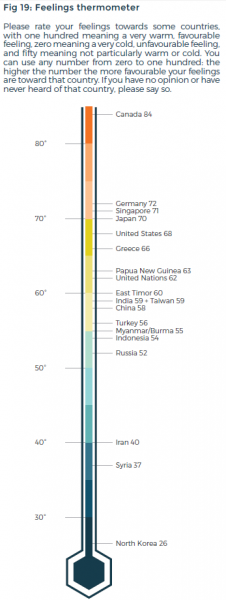
The annual feelings thermometer, which measures Australians’ feelings towards a range of other countries on a scale of 0° in temperature (coldest feelings) to 100° (warmest feelings), has been included in all Lowy Institute Polls since 2005. A limited sample of countries is selected each year, and most countries are rotated in and out of the sample. Eighteen countries were included this year.
It has been a feature of every Lowy Institute Poll that an English-speaking country tops the thermometer, and this year is no exception. Canada tops the 2016 list, with Australians rating it a warm 84° (up three degrees).
Twelve degrees cooler than Canada, but still at a very warm 72°, feelings towards Germany remain steady. Australians have warmed towards Singapore, with feelings up four degrees since it was last included in 2013 to 71°. Japan also rates a warm 70°, its equal highest result in 11 years.
The United States is the only country for which Australian feelings have cooled significantly, down five degrees on last year’s result to 68°, although still warmer than they were at their coolest point of 60° in 2007. This cooling aligns with our findings of reduced support for the US alliance this year and coincides with the US presidential election season (see page 7).
While Greece’s economy struggles and it grapples with the inflow of Syrian refugees, Australians feel quite warmly towards it (66°).
Papua New Guinea celebrated 40 years of independence in 2015, and Australians’ feelings towards it have warmed five degrees this year to 63°. East Timor, another Pacific neighbour, enjoys a similarly warm spot on the thermometer at 60°.
Feelings towards India (59°), Taiwan (59°) and China (58°) remain steady. Turkey was included for the second time this year, rating a warmish 56°. Close behind is Myanmar, up five degrees since 2014 to 55°.
The biggest movement this year was Indonesia’s eight degree warming to 54°, its equal highest reading in 11 years of the thermometer. Russia has also lifted significantly to a lukewarm 52°, seven degrees higher than its cool 45° last year.
At the cold end of the thermometer, feelings towards Iran remain cool at 40°, although on a warming trend since 2011. Feelings towards Syria have warmed four degrees to a still-cold 37°, while Australians continue to feel a frosty 26° towards North Korea at the bottom of the thermometer, and falling.
With the election of a new UN Secretary-General at the end of this year, we asked Australians for the first time how they feel about the United Nations. At a warm 62°, the United Nations ranks between Papua New Guinea and East Timor on this year’s thermometer.
Table of results
Please note that totals may not add to 100% due to rounding. Each response option has been rounded individually and grouped responses (e.g. those who ‘somewhat agree’ plus ‘strongly agree’) have not been rounded at the group level. Responses of ‘don’t know’, ‘no view’, ‘none’ and similar were recorded if given by respondents, but not offered. Throughout the tables an ‘*’ represents a response given by less than 0.5% of people.
Election 2016
Table 1: Now about the Australian federal election which will be held later this year. Which party, either the Labor Party or the Liberal-Nationals Coalition, do you personally think would do a better job of handling each of the following issues:
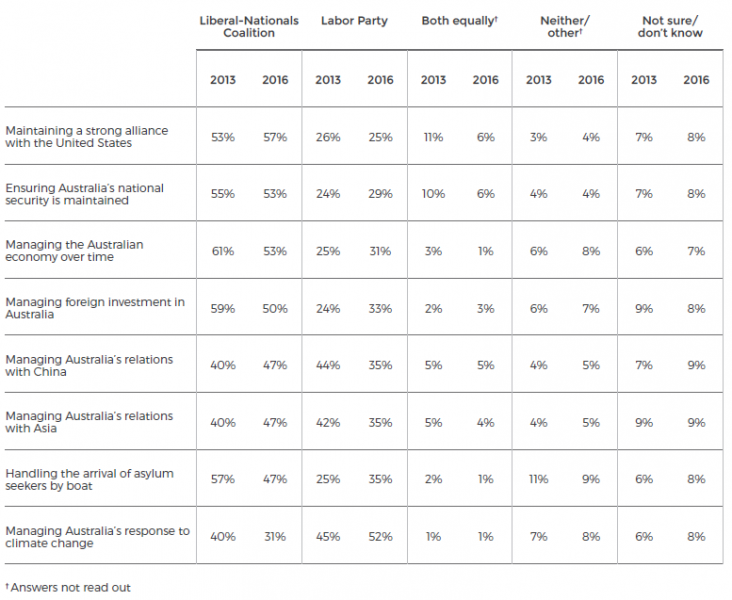
Australian prime ministers and foreign policy
Table 2: Now thinking about how different Australian prime ministers have handled our foreign policy. In your personal view, has each of the following prime ministers done a very good job, a reasonable job, or a poor job in handling Australia’s foreign policy?
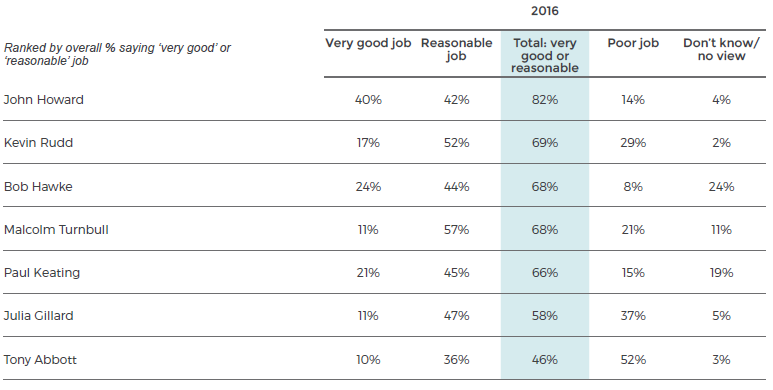
Donald Trump and Australia–US relations
Table 3: And now about Australia’s relations with the United States and its President. If a person like Donald Trump were elected President of the United States, which one of the following statements comes closest to your personal view:

Importance of the US alliance
Table 4: And now about Australia’s alliance relationship with the United States. How important is our alliance relationship with the United States for Australia’s security?
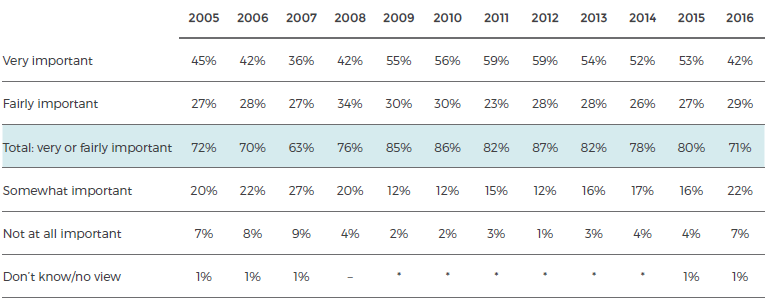
Economic optimism
Table 5: Now about Australia’s economic performance in the world. Overall, how optimistic are you about Australia’s economic performance in the world over the next five years?
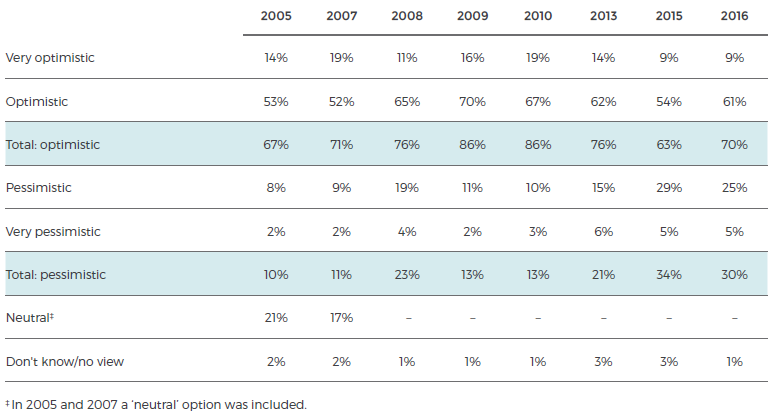
Important issues facing Australia
Table 6: Thinking about important issues facing Australia at the moment. Please say whether you personally think each of the following is a very important issue, a somewhat important issue, or not an important issue facing Australia at the moment:
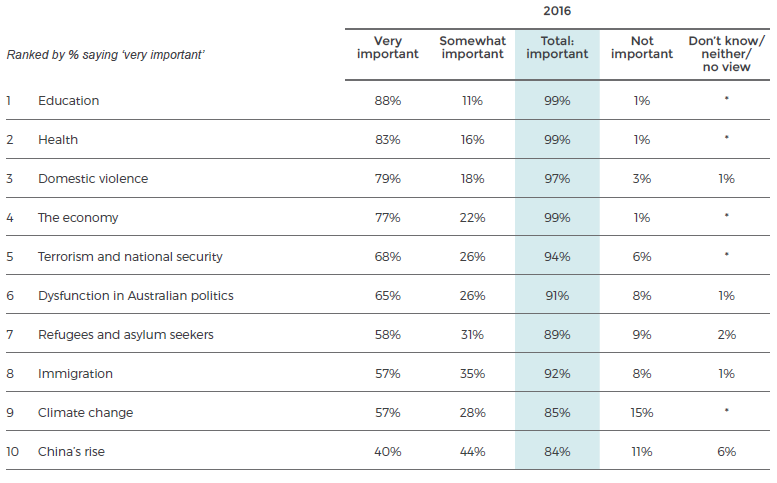
Australia’s role in the world
Table 7: Thinking about Australia’s role in the world. Which one of the following statements most closely represents your own view:

Military action against Islamic State in Iraq and Syria
Table 8 (IRAQ): Thinking now about the organisation called Islamic State, also known as ISIL. As part of an international effort, the Australian Defence Force is currently conducting air strikes against Islamic State in Iraq, and providing training and support to Iraqi security forces. Are you personally in favour or against Australia participating in this action against Islamic State in Iraq? This question was first asked on behalf of the Lowy Institute by Newspoll in its omnibus survey on 10–12 April 2015 (sample: 1215 respondents)
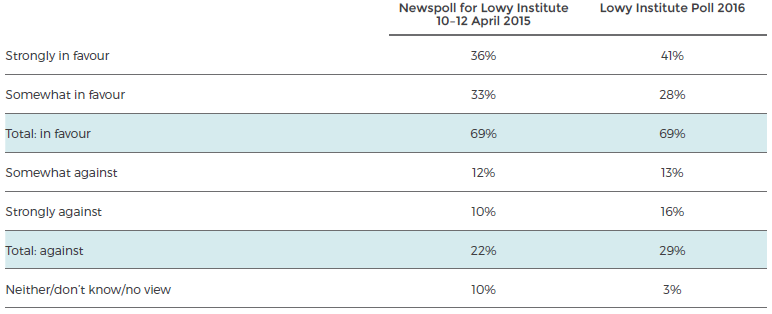
Table 9 (SYRIA): Last year, Australia extended its operations against Islamic State to include air strikes in Syria. Are you personally in favour or against Australia conducting air strikes against Islamic State in Syria?
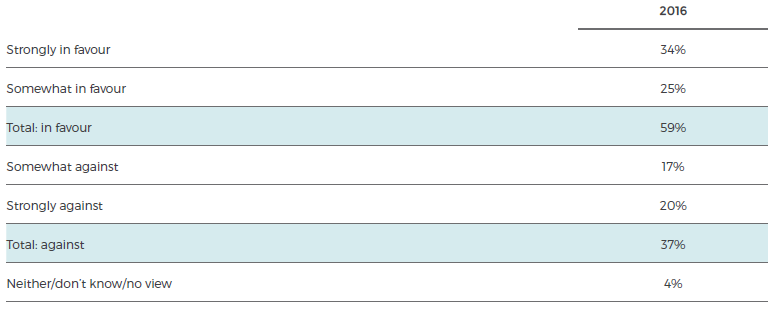
Submarines
Table 10: And now about Australia’s proposed purchase of new submarines. Companies in France, Germany and Japan are in a competitive tender to build Australia’s next generation of submarines. Which statement comes closest to your personal view?

Australia’s best friend in Asia
Table 11: Thinking about Australia’s relations in Asia. In your personal opinion, which one of the following countries is Australia’s best friend in Asia?
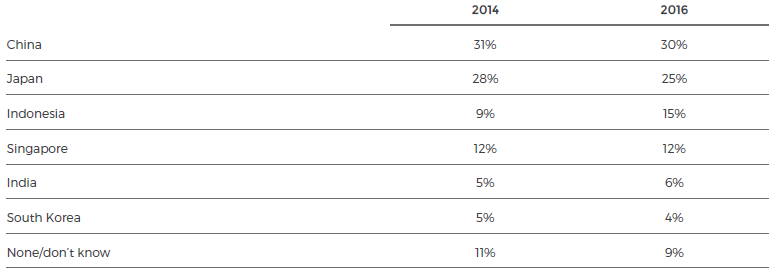
Australia, the United States and China
Table 12: Thinking about Australia’s relationships with the United States and China. Which relationship do you think is more important to Australia?

Attitudes to China
Table 13: Still on China. For each of the following factors, please say whether, for you personally, they have a positive or negative influence on your overall view of China:
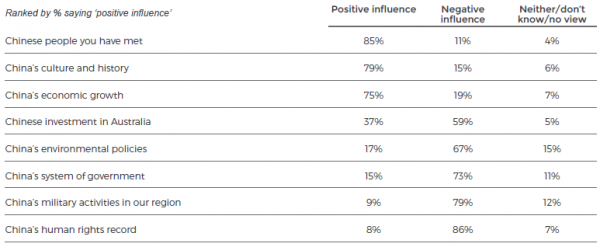
Freedom of navigation in the South China Sea
Table 14: In response to China’s increasing military activities in the South China Sea, the United States has been conducting maritime operations designed to ensure freedom of navigation in the region. Are you personally in favour or against Australia conducting similar operations in an effort to ensure freedom of navigation in the South China Sea?

China’s economy
Table 15: Please tell me which statement most closely matches your own opinion about China’s economy in the next five years:

Foreign investment in Australian farmland
Table 16: Now about foreign companies buying Australian farmland. Are you personally in favour or against the Australian government allowing foreign companies to buy Australian farmland?
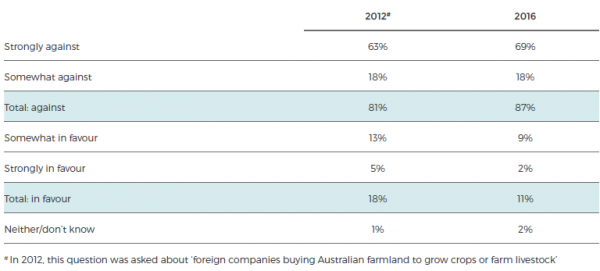
Democracy
Table 17: Now a question about democracy. I am going to read you three statements about democracy. Please say which one of the three statements comes closest to your own personal views about democracy:

Table 18: Views of 18–29 year olds on democracy (sample: 182 respondents)

Refugee policy
Table 19: Now about Australia’s refugee policies. Please say whether you personally agree or disagree with each of the following statements:

Immigration
Table 20: Thinking about immigration to Australia. Please say whether you personally agree or disagree with each of the following statements about immigration:

Importance of Indonesia
Table 21: Now about Indonesia. In your personal view, how important is Indonesia to Australia? Do you think it is:

Europe
Table 22: Thinking now about Europe. Please say whether you personally agree or disagree with each of the following statements about Europe:
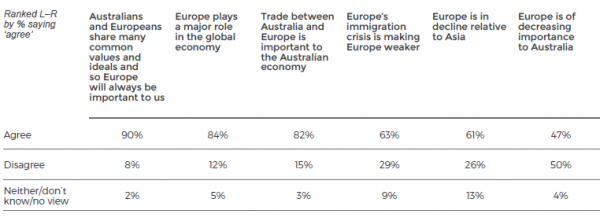
Climate change and concern about global warming
Table 23: Now about global warming. There is a controversy over what the countries of the world, including Australia, should do about the problem of global warming. I’m going to read you three statements. Please tell me which statement comes closest to your own point of view:
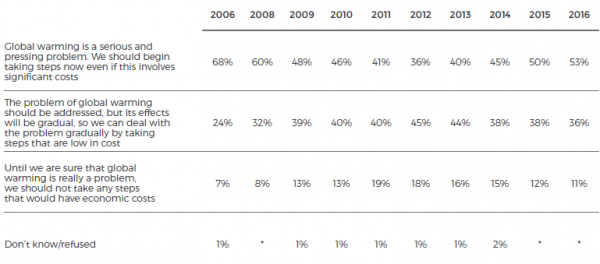
Fossil fuels
Table 24: Now here are some statements made by other people about fossil fuels such as coal. Please say whether you personally agree or disagree with each of the following statements:

Kevin Rudd and the UN Security Council
Table 25: Now about the United Nations. A new Secretary-General of the UN will be elected at the end of this year, and Kevin Rudd has been named as a possible candidate. In your personal view, would Kevin Rudd be a good Secretary-General of the UN, or not?

Feelings towards other countries
Table 26: Please rate your feelings towards some countries, with one hundred meaning a very warm, favourable feeling, zero meaning a very cold, unfavourable feeling, and fifty meaning not particularly warm or cold. You can use any number from zero to one hundred: the higher the number the more favourable your feelings are toward that country. If you have no opinion or have never heard of that country, please say so.# Using the same scale, please rate your feelings towards the United Nations.
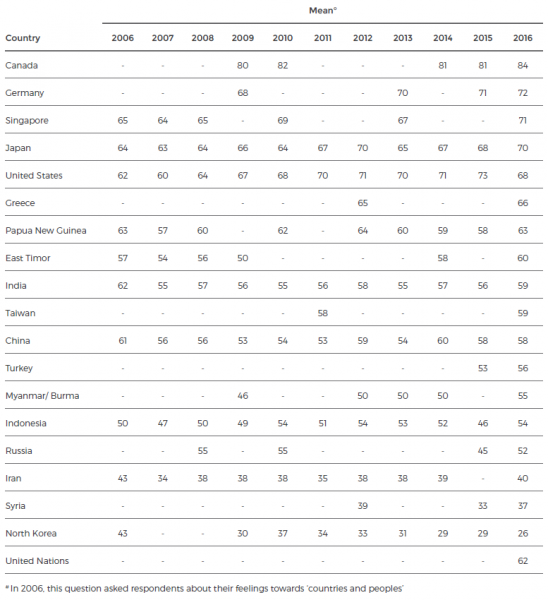
Notes
[1] Department of Defence, Ministerial and Executive Coordination and Communication, “Australian Air Task Group Commences Operational Missions over Iraq,” media release, 2 October 2014, http://news.defence.gov.au/2014/10/02/australian-air-task-group-commences-operational-missions-over-iraq/.
[2] Minister for Defence, The Hon Kevin Andrews MP, “Transcript — Interview with Marius Benson ABC News Radio,” 16 September 2015, http://www.minister.defence.gov.au/2015/09/16/minister-for-defence-transcript-interview-with-marius-benson-abc-news-radio/.
[3] Prime Minister, The Hon Malcolm Turnbull MP and Defence Minister, Senator the Hon Marise Payne, “Future Submarine Program,” joint media release, 26 April 2016, http://www.minister.defence.gov.au/2016/04/26/prime-minister-minister-for-defence-joint-media-release-future-submarine-program/.
[4] Australian Government, Department of Defence, “Maritime Operations and Anti-Submarine Warfare,” in 2016 Defence White Paper, http://www.defence.gov.au/Whitepaper/AtAGlance/Maritime-Ops.asp.
[5] Matt Siegel, “Australia Kicks Off $39 billion Submarine tender,” Reuters, 25 March 2015, http://www.reuters.com/article/australia-submarines-idUSL3N0WR1OV20150325.
[6] Ankit Panda, “After Months of Waiting, US Finally Begins Freedom of Navigation Patrols Near China’s Man-Made Islands,” The Diplomat, 27 October 2015, http://thediplomat.com/2015/10/after-months-of-waiting-us-finally-begins-freedom-of-navigation-patrols-near-chinas-man-made-islands/;Jesse Johnson, “US Defies Chinese Maritime Claims after Warship Sails Near Island in Disputed South China Sea,” Japan Times, 31 January 2016,
http://www.japantimes.co.jp/news/2016/01/31/asia-pacific/u-s-warship-sails-near-island-claimed-by-beijing-in-south-china-sea/#.VzkbRvl96Ul;
Michael Martina, Greg Torode and Ben Blanchard, “China Scrambles Fighters as US Sails Warship Near Chinese-claimed Reef,” Reuters, 10 May 2016, http://www.reuters.com/article/us-southchinasea-usa-china-idUSKCN0Y10DM.
[7] World Bank, “China Country Overview,” 6 April 2016, http://www.worldbank.org/en/country/china/overview; Mark Magnier, “China’s Economic Growth in 2015 is Slowest in 25 Years,” The Wall Street Journal, 19 January 2016, http://www.wsj.com/articles/china-economic-growth-slows-to-6-9-on-year-in-2015-1453169398.
[8] Dominique Schwartz, “Kidman Land Sale: Chinese Bidder for Australian Cattle Empire Withdraws Offer,” ABC News, 3 May 2016, http://www.abc.net.au/news/2016-05-03/chinese-bidder-for-kidman-cattle-empire-withdraws-offer/7380116.
[9] In 2012, the question asked was ‘Are you personally in favour or against the Australian government allowing foreign companies to buy Australian farmland to grow crops or farm livestock?’: see table 16, page 26.
[10] Government of Western Australia, Department of the Premier and Cabinet, “Projects and Special Events: Syrian/Iraqi Refugee Intake,” https://www.dpc.wa.gov.au/ProjectsandSpecialEvents/Pages/syrian-iraqi-refugee-intake.aspx.
About the Lowy Institute Poll
The 2016 Lowy Institute Poll reports the results of our annual, nationally representative telephone opinion survey, conducted this year between 26 February and 15 March 2016 with a sample size of 1202 Australian adults.
A number of the questions in the Poll were first asked in previous Lowy Institute Polls, or have been adapted from questions asked in those years. Repeating questions in successive years allows us to compare public opinion on a single issue over time, building trend data on important international policy issues.
Some of our questions this year are identical to questions asked previously by other survey organisations, which allows for the comparison of public opinion internationally.
The order of questions in the questionnaire was different from the order presented in this report.
Methodology
For this year’s annual Poll fieldwork, Field Works Market Research conducted a total of 1202 interviews by fixed and mobile telephone, with a sample designed to be nationally representative of all Australians 18 years and older. Quotas were set for each state and territory, with broad age-group and gender quotas. Interviewers continued making calls until each quota was filled. Within each geographic area, telephone numbers were randomly selected from regularly updated active residential and mobile phone number databases.
To ensure the sample included those people who tend to spend a lot of time away from home, a system of call backs and appointments was incorporated.
The results were then weighted to reflect the demographic profile of the Australian population aged 18 years and over, using data from the Australian Bureau of Statistics.
These weights were used in the production of all the tables for this report. On a truly random sample of 1202 the maximum sampling variance (or ‘margin of error’) is 2.8%, which means there is a 95% chance that responses from the sample fall within a range of 2.8% either side of the notional collective response of the whole population. Since these samples were stratified (by state/territory, age group and sex), the error figure is a guide only. Where the results for a sub-sample are reported, the margin of error is greater.
Acknowledgements
Several of the questions in this year’s Poll were modelled on those developed by other polling organisations, including the Pew Research Center, The Scanlon Foundation and The Environics Institute for Survey Research. Other questions in our annual polling draw from work by the Chicago Council on Global Affairs.
The fieldwork for the 2016 Lowy Institute Poll was managed by Tamara de Silva of Field Works Market Research. Sol Lebovic, Research Consultant, provided technical support, reviewed the questionnaire and helped interpret the data. The surveys were funded entirely by the Lowy Institute for International Policy.


